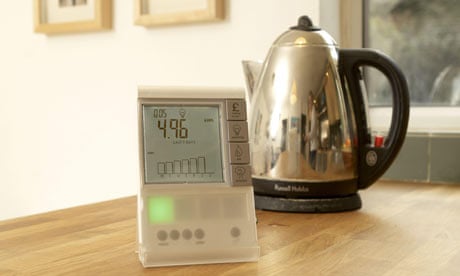Every home in the UK must be fitted with a "smart meter" by 2020 to reduce energy use and pave the way for a low-carbon "smart grid", under plans unveiled by the government today.
The new meters will send information on real-time electricity and gas use in households and small businesses direct to utility companies, eliminating the need for customers to stay at home for meter readings or to receive over-estimated bills. However, consumers are likely to pick up some of the costs of the compulsory, nationwide scheme.
The government estimates putting smart meters in the country's 26m homes could save customers and energy companies £2.5bn-£3.6bn over the next 20 years, but says it will cost more than double this to buy and install the equipment.
Launching a consultation on how the smart meters should be rolled out, the Department for Energy and Climate Change (DECC) claimed the scheme will be the biggest smart meter project in the world.
"The meters most of us have in our homes were designed for a different age, before climate change," said Ed Miliband, the energy and climate change secretary. "Now we need to get smarter with our energy ... so it's important we design a system that brings best value to everyone involved."
Energy companies welcomed the switch, which will reduce their running costs by making meter readers obsolete and eliminating the customer service time spent on dealing with estimated bills. Consumers and small business owners could benefit from savings achieved through increased awareness of their energy use. Previous studies have shown that smart meters encourage homeowners to cut their energy use by 3-15%, although experts warn that the technology requires consumer education and is not an "install and forget" energy-efficiency measure like loft insulation.
Consumer groups warned that homeowners should not have to shoulder heavy costs for the new meters. Replacing today's meters by the end of 2020 is expected to cost £8.11bn under the government's preferred plan, with utility companies paying upfront, but able to pass on the charge. "Bill-payers have been suffering for many years from ever-increasing bills, so I hope the cost of the scheme – up to £340 for every household – won't wholly be put at their feet," said Scott Byrom, utilities manager at Moneysupermarket.com.
The Energy Retail Association – which represents the major electricity and gas companies – said that smart meters will be "cost-neutral" to customers because the savings to its members will part-fund the roll out.
Smart meters will also play a key role in helping the government meet its greenhouse gas reduction targets of at least 34% by 2020. The meters make it easier for householders to sell power they generate through wind and solar back to the grid. They will also allow suppliers to smooth the peaks and troughs of UK electricity demand by offering cheaper electricity at times of low demand, and increasing the price when demand is high. Reducing peak demand means fewer power stations need to be on standby, thereby cutting carbon emissions.
Ultimately, smart meters will allow the electricity used by domestic appliances to be "dynamically" managed. This would mean switching off refrigerators for a few minutes at times of high demand, or using plugged-in electric vehicles to store power. This flexibility is crucial if a significant amount of clean, renewable energy is to be supplied from harnessing the sun, wind and waves, all of which vary with the weather. A government report last year suggested such "demand management" technology could save 2m tonnes of CO2 a year.
Environmental campaigners and opposition politicians warned that the 2020 timetable was not fast enough. The shadow energy and climate change secretary, Greg Clark, said: "In other countries around the world, smart meters are being rolled out now. Ten years [to install] a technology that's already available seems very leisurely considering the urgency of climate change." However, consultants Ernst & Young noted that even fitting 2.6m homes with meters every until 2020 was "challenging".
Three plans are under consideration for the natiowide roll-out of smart meters. The first sees utilities take on all responsibilities, including supply and installation, plus the data management. The second – the government's preferred model – has energy suppliers responsible for the meters, but with a new third party body handling the energy data. A third scenario envisages setting up a new organisation to oversee both the meters and data management.
Smart meter trials are already under way around the country through energy companies including British Gas and Npower, and smaller suppliers such as First Utility already supply smart meters as standard. The first smart meters installed under the government's new plans are expected to arrive in 2012.




Comments (…)
Sign in or create your Guardian account to join the discussion